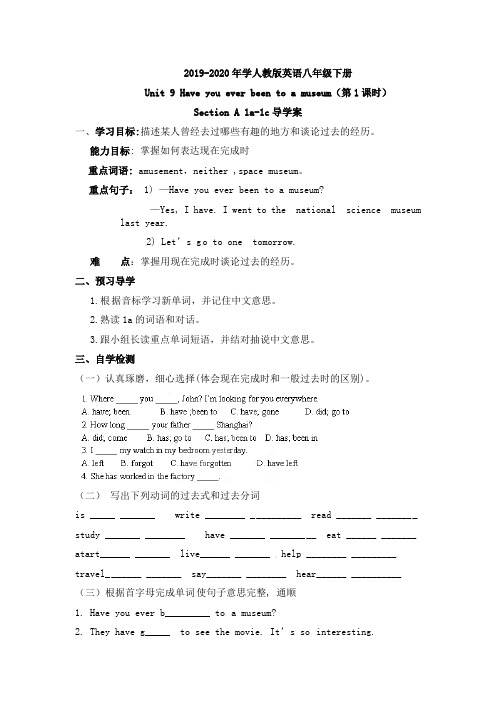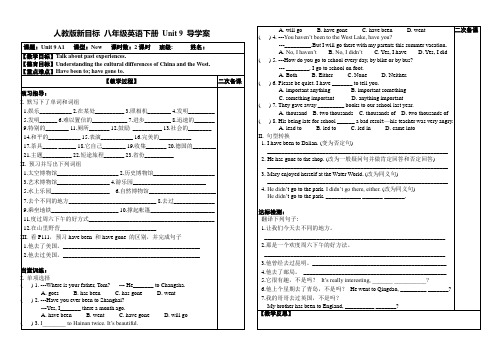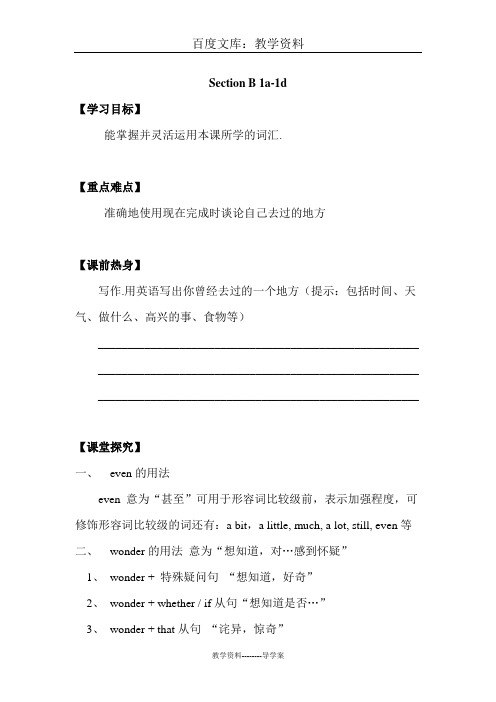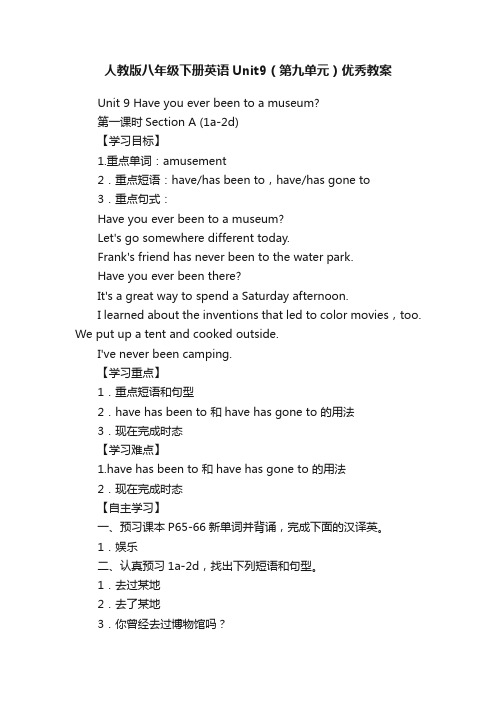人教版(八下)英语导学案Unit 9 第四课时Section B(1a-Self Check).doc
新人教版八年级下册英语 Unit 9 第4课时 教案(教学设计)

Step 4
Language
points
1. three quarters四分之三
(1)英语中分数表达法为“分子+分母”结构,分子用基数词,分母用序数词;分子大于1时,分母的序数词用复数形式,常用“分数+of+名词”表示“……中的几分之几”
2. Let Ss write an artice with the help of 3a and the information of 3b.
1. Ss fill in the chart.
2. Write down their composition in their exercise-books.
whoever = no matter who无论谁
whatever = no matter what无论什么
wherever = no matter where无论哪儿
however = no matter how无论怎样
Listen to the teacher carefully and take notes.
(2)当分母是“四”时,常用a quarter表示四分之一; three quarters表示四分之三。
(3)分子和分母之间既可以加连字符“—”,也可以不加。
2. whetherconj.是否
(1)whether引导让步状语从句,意为“不管……(还是)”,在表示选择时,用whether. . . or. . . ;
③You won’t have any problem finding rice, noodles, or dumplings.T
④Singapore isn’t an excellent place to try new food.F
八年级英语下册(人教版)Unit9第4课时SectionB(1a1d)教学设计

3.教师通过PPT展示一些关于才艺比赛的图片,引导学生谈论自己或他人参加过的才艺比赛,激发学生的学习兴趣。
(二)讲授新知
1.教师呈现本课时的新单词和短语,如:solo, victory, confidence, perform, talent contest等,引导学生跟读并解释词义,让学生在实际语境中理解单词和短语。
五、作业布置
为了巩固本节课的学习内容,培养学生的自主学习能力,特布置以下作业:
1.复习本课时的新单词和短语,如:solo, victory, confidence, perform, talent contest等,并能熟练运用到实际语境中。
2.根据课堂所学,运用一般过去时编写一个小故事,描述自己或他人参加过的才艺比赛或表演。要求:故事内容丰富,语法正确,不少于80词。
八年级英语下册(人教版)Unit9第4课时SectionB(1a1d)教学设计
一、教学目标
(一)知识与技能
1.掌握本课时的新单词和短语,如:solo, victory, confidence, perform, talent contest等,并能熟练运用到实际语境中。
2.学习并掌握一般过去时的用法,能够运用一般过去时描述过去发生的事情。
(2)组织小组竞赛,培养学生的团队精神,提高他们的竞争意识。
四、教学内容与过程
(一)导入新课
1.教师以一首英文歌曲《Yesterday》作为课堂导入,引导学生关注歌词中的过去事件描述,为新课的学习营造氛围。
2.教师提出问题:“Can you tell me what happened in the song? How did the singer use the past tense?”,让学生思考并回答,为新课的学习做好铺垫。
2019-2020年学人教版英语八年级下册Unit9全单元导学案设计

2019-2020年学人教版英语八年级下册Unit 9 Have you ever been to a museum(第1课时)Section A 1a-1c导学案一、学习目标:描述某人曾经去过哪些有趣的地方和谈论过去的经历。
能力目标: 掌握如何表达现在完成时重点词语: amusement,neither ,space museum。
重点句子: 1) —Have you ever been to a museum?—Yes, I have. I went to the national science museum last year.2) Let’s g o to one tomorrow.难点:掌握用现在完成时谈论过去的经历。
二、预习导学1.根据音标学习新单词,并记住中文意思。
2.熟读1a的词语和对话。
3.跟小组长读重点单词短语,并结对抽说中文意思。
三、自学检测(一)认真琢磨,细心选择(体会现在完成时和一般过去时的区别)。
(二)写出下列动词的过去式和过去分词is _____ _______ write ________ __________ read _______ ________study _______ ________ have _______ _________ eat ______ _______atart______ _______ live______ _______ help ________ _________travel_______ _______ say_______ ________ hear______ __________(三)根据首字母完成单词使句子意思完整, 通顺1. Have you ever b_________ to a museum?2. They have g_____ to see the movie. It’s so interesting.3. I hope that they will have a wonderful time in the a park.4. ------I have never seen such an interesting water park.----Me n .5. I like animals in water . So I’m going to an a四、合作探究现在完成时(一)I.用法:现在完成时表示过去发生的动作对现在造成的影响或结果。
八年级(下)英语学科导学案Unit9B

八年级(下)英语学科导学案Unit9Have you ever been to an amusement park?(Section B)教师寄语:Custom makes all things easy.有个好习惯,事事皆不难。
一、学习目标1) 单词与短语exchange student, attendant, flight attendant, discover, requirement,guide, tour guide2)目标句型:1. Where do you want to go?2. How long have you been doing…?3. What do you like best about doing sth.?4. What kind of job do you want?5. How do/did you do sth.?3) 语法现在完成时态。
二、教学重点和难点1.教学重点:现在完成时态。
2.教学难点:现在完成时态。
三、知识链接现在完成进行时态。
四、学法指导:通过小组合作学习,探究讨论,结合导学案及相关资料理解各知识点,掌握本节学习内容。
五、导学过程:1. 组长带领组员复习现在完成进行时。
2. 组长带领组员通读课本from page 71 to 72,理解其含义并完成表格。
3. 组长带领组员熟读3a课文,并指定课堂朗读人选。
4. 组长带领组员找出课本(from page 71 to 72)的重要短语、句子。
并指定课堂展示人选。
5. Language points:(一)have been to / have gone to区别1)have been to表示曾经去过某处,但现在人不在那了。
可以和次数连用。
I have been to Beijing. I went there last year.I have been to Shanghai twice.如遇到adv.(where, here, there, home, abroad)省略to.Have you ever been abroad?Where have you been?2)have gone to 已经去了某地,现在人可能在去的途中或返回途中,或已在那了。
新人教版八年级英语下册导学案:unit9 4 四课时

Unit 9 Have you ever been to a museum Section A 1a—1c一、学习目标:描述某人曾经去过哪些有趣的地方和谈论过去的经历。
能力目标: 掌握如何表达现在完成时重点词语: amusement,neither ,space museum。
重点句子:1) —Have you ever been to a museum?—Yes, I have. I went to the national science museum last year.2) Let’s go to one tomorrow.难点:掌握用现在完成时谈论过去的经历。
二、预习导学1. 根据音标学习新单词,并记住中文意思。
2.熟读1a的词语和对话。
3.跟小组长读重点单词短语,并结对抽说中文意思。
三、自学检测(一)认真琢磨,细心选择(体会现在完成时和一般过去时的区别)。
(二)根据首字母完成单词使句子意思完整, 通顺1. Have you ever b_________ t o a museum?2. They have g_____ to see the movie. It’s so interesting.3. I hope that they will have a wonderful time in the a park.4. ------I have never seen such an interesting water park.----Me n .5. I like animals in water . So I’m going to an a四、合作探究现在完成时(一)I.用法:现在完成时表示过去发生的动作对现在造成的影响或结果。
常与下列时间状语连用:just , already, yet, ever, never, before, several times。
现在完成时不能和表示过去的时间(如:yesterday, last, year, in 1976, two days ago, just now, wh en she came in 等)连用。
人教版新目标八年级英语下册 Unit 9 导学案

人教版新目标八年级英语下册Unit 9 导学案课题:Unit 9 A1 课型:New 课时数:2课时班级: 姓名:【教学目标】Talk about past experiences.【德育目标】Understanding the cultural differences of China and the West.【重点难点】Have been to; have gone to.【教学过程】二次备课预习指导:I. 默写下了单词和词组1.娱乐___________2.在某处__________3.照相机________4.发明_________5.发明______6.难以置信的____________7.进步_________8.迅速的_______9.特别的________ 11.厕所_______ 12.鼓励__________ 13.社会的________14.和平的___________ 15.表演___________ 16.完美的___________17.茶具_____ ______ 18.它自己________ 19.收集_______ 20.德国的________21.主题__________ 22.短途旅程_______ 23.省份__________II. 预习并写出下列词组1.太空博物馆_____________________2.历史博物馆_____________________3.艺术博物馆__________________4.游乐园_________________________5.水上乐园____________________6.自然博物馆_______________________7.去个不同的地方______________________________ 8.去过______________9.乘坐地铁_______________________ 10.撑起帐篷______________________11.度过周六下午的好方式___________________________________________12.在山里野营_________________________________III. 看P111,预习have been 和have gone 的区别,并完成句子1.他去了美国。
【人教版】八年级下册英语导学案:Unit 9 Section B(1a-1d)导学案

Section B 1a-1d【学习目标】能掌握并灵活运用本课所学的词汇.【重点难点】准确地使用现在完成时谈论自己去过的地方【课前热身】写作.用英语写出你曾经去过的一个地方(提示:包括时间、天气、做什么、高兴的事、食物等)_______________________________________________________ _______________________________________________________ _______________________________________________________【课堂探究】一、even的用法even 意为“甚至”可用于形容词比较级前,表示加强程度,可修饰形容词比较级的词还有:a bit,a little, much, a lot, still, even等二、wonder的用法意为“想知道,对…感到怀疑”1、wonder + 特殊疑问句“想知道,好奇”2、wonder + whether / if从句“想知道是否…”3、wonder + that从句“诧异,惊奇”三、辨析be able to与can1、be able to表示经过努力后获得的能力或能做某事,可用于将来时、完成时和过去时,时态较多.如:In the end,some of them were able to pass the exam.2、Can表示能做某事,不强调能力,只用于一般现在时及一般过去时.如:At home he can do what he wants.四、辨析with、by、in “用”1、with,多指使用某种工具或用身体的某个部位或器官来完成某项活动.如:He cut it open with a knife.2、by,指采用某种方法、手段,by doing sth.如:I learn English by asking the teacher for help.3、In,指使用某种语言、采用某种途径或选用某种材料等如:Can you sing this song in English?【当堂检测】一、用所给词的适当形式填空.1、He _____ (be) to the History Museum several times.2、--________ you ever _______ (be) to the zoo?--Yes, I________(go) there last summer. I ________ (see) many kinds of animals there.3.—Where is Mr. Wang?---He ______ (go) to the library. He wants to borrow some library books.4. Xiao Ming _____ (plant) those trees. He _________ (do) it the day before yesterday.5. We ______ (learn) English for more than two years.二、单项选择.1. How long have you been _____English?A. studyB. studiedC. studyingD. studyed2. He called me up when I ______a shower this morning.A. haveB. hadC. have hadD. was having3. I think Ann _____a supper star in only 2 years?A. isB. is going toC. is beingD. has been4. Have you ever ______to travel around?A. take a trainB. took trainC. by a trainD. by trains5. The kids from mountains districts _______ never _______ computer games before. They’re so excited.A. have; playedB. did; playC. are; playingD. do; play6. When I was fifteen years old, I got _____all kinds of stamps.A. to collectB. to collectingC. collectD. to7、I want to tell Mike about the thing. But he just ______ it.A. wasn’t interestedB.wasn’t interested inC. didn’t interestD. interested【教学反思】。
人教版八年级下册英语Unit9(第九单元)优秀教案

人教版八年级下册英语Unit9(第九单元)优秀教案Unit 9 Have you ever been to a museum?第一课时Section A (1a-2d)【学习目标】1.重点单词:amusement2.重点短语:have/has been to,have/has gone to3.重点句式:Have you ever been to a museum?Let's go somewhere different today.Frank's friend has never been to the water park.Have you ever been there?It's a great way to spend a Saturday afternoon.I learned about the inventions that led to color movies,too. We put up a tent and cooked outside.I've never been camping.【学习重点】1.重点短语和句型2.have has been to 和have has gone to 的用法3.现在完成时态【学习难点】1.have has been to 和have has gone to 的用法2.现在完成时态【自主学习】一、预习课本P65-66新单词并背诵,完成下面的汉译英。
1.娱乐二、认真预习1a-2d,找出下列短语和句型。
1.去过某地2.去了某地3.你曾经去过博物馆吗?4.今天让我们去一些不同的地方吧。
5.Frank的朋友从来没有去过水上公园。
6.你去过那里吗?7.这是一个度过周六下午的好方法。
8.我了解到了有关那个导致彩色电影出现的发明。
9.我们支起了一个帐篷并且野炊。
10.我从来没有野营过。
【课堂导学】Step 1情景导入(Show the pictures of amusement parks,water parks,space museums,zoos art museums,and history museums) Teacher:What can you see in the picture?(Look at the pictures and brainstorm the words they can think of,such as space museum,amusement park,water park,zoo,art museum and history museum.)T:Have you ever been to an amusement park?Ss:No.T:Now,we'll learn Unit 9—Have you ever been to a museum?环节说明:通过多媒体图画的谈论问答,并因势引导,采用师生之间的交流方式,自然导入“Have you ever been to a museum?”(“你曾经去过某地吗?”)这一话题。
- 1、下载文档前请自行甄别文档内容的完整性,平台不提供额外的编辑、内容补充、找答案等附加服务。
- 2、"仅部分预览"的文档,不可在线预览部分如存在完整性等问题,可反馈申请退款(可完整预览的文档不适用该条件!)。
- 3、如文档侵犯您的权益,请联系客服反馈,我们会尽快为您处理(人工客服工作时间:9:00-18:30)。
Unit 9 Have you ever been to a museum?第四课时Section B(1a-Self Check)【Free talk】Talk about Singapore with your classmate.【学习目标】1. 学习下列单词:thousand, safe, simple, fear, whether, India, Japanese, fox, daytime, equator, whenever, spring2. 学习下列短语:on the one hand, on the other hand; thousands of, an English-speaking country, have problems doing, it seems to do,3. 能熟练地就文章内容回答问题4. 学会正确使用现在完成时。
【导学案】一、写出下面的短语和句子:1. 长城_______________2. 鸟巢_______________3. 成千上万_______________4. 说英语的国家_______________5. 一方面,另一方面_______________6. 醒来_______________7. 一年到头_______________8. 距不太远_______________二、阅读课文,完成2c-2e。
【课中案】一、自主学习温故知新1.用一分钟写出本单元你所学的新单词。
2.用本单元Grammar Focus 的句型相互提问。
自主互助学习阅读文章Singapore- A place you will never forget! 完成活动2c-3b.二、质疑解惑1. be from,come from:两者都为“从…来,出自…”;表示“出身于…”,应用come from【注意】问别人的出身或叙述自己的出身时,时态一定要用一般现在时,如果时态为一般过去时,则表示“从…地方来”。
2.Population的用法:1)population是个集合名词,意思为“人口,人数”,常用来指人口的总称。
被看作一个整体时,一般不加-s,在句中作主语时,谓语动词多用单数形式。
如,The population of China is about1,300,000,000.2)如果指一个整体中有多少人数是干什么的时候,谓语动词要用复数形式,这时强调的是一部分人。
如,Half of the population in that country are farmers.3)表示“…的人口”时,既可用“the population of+地名”,也可用“the population in +地点”,作主语中心词时谓语动词用单数形式。
如,The population in Shenyang is about 8 million.4)表示某国,某城市有多少人口时,用have/has a population of…结构。
如,New Zealand has a population of 3,800,000.5)对人口数量提问用what 或what large.用large或big表示人口多,用small表示人口少。
3. If的用法:if引导的条件状语从句表示“如果…”。
构成形式为“主句+一般将来时态+if从句+一般现在时态”,或“If从句+一般现在时态,主句+一般将来时态”;if还可以引导虚拟语气,表示假设的情况或是发生的可能性不大的情况,从句用过去的某种时态。
4. seem的用法“好像、似乎” , 其后加形容词。
He seems unhappy today.他今天好像不高兴。
She seems sad.她似乎很伤心。
1) seem +(to be) +n. They seem (to be) doctors.他们好像是医生。
2) seem +(to be) +介词It seems like years since I last saw Mr Green. 从上次遇到格林先生, 好像过了许多年。
3) seem to do something. He seems to be happy. 他好像很高兴。
My mother seemed to know that.我妈妈好像知道那件事。
4) It seems that + 从句It seems that he is happy.= He seems (to be) happy.他好像很快乐。
5. hear,hear of与hear from (1)hear为及物动词,意为“听见,听到”,后可跟复合宾语,hear sb do sth表示“听见某人做了某事”或hear sb doing sth表示“听见某人正做某事”。
We listened but could hear nothing.我们留心听,却什么也没有听见。
I heard her singing in her room.我听见她正在房间里唱歌。
(2)hear还可作“听说”讲,后常跟that引导的宾语从句。
I heard that he was ill.我听说他病了I heard that it’s a good film.我听说那是部好影片。
(3)hear of意为“听说”,后跟人或物作宾语。
I’ve never heard of that place.我从未听说过那个地方。
Have you ever heard of that story?你听说过那个故事吗?(4)hear from意为“收到某人的来信”,后跟人作宾语。
How often do you hear from your sister?你多长时间收到你姐姐的一次信?I heard from him last week.6. find,find out与look for都含有“寻找,找到”的意思,但其含义和用法却不同。
(1)find意为“找到,发现”,通常指找到或发现具体的东西,也可指偶然发现某物或某种情况,强调的是找的结果Will you find me a pen? 你替我找支钢笔好吗?He didn’t find his bike.他没找到他的自行车。
(2)look for意为“寻找”,是有目的地找,强调“寻找”这一动作。
I don’t find my pen;I’m looking for it everywhere.我没有找到我的钢笔,我正到处找。
He is looking for his shoes.他在找他的鞋子。
(3)find out意为“找出,发现,查明”,多指通过调查、询问、打听、研究之后“搞清楚,弄明白”,通常含有“经过困难曲折”的含义,指找出较难找到的、无形的、抽象的东西。
Please find out when the train leaves.请查一下火车什么时候离站。
【达标与巩固练习】I、选词填空(注意形式)1. already, yet, still, ever, never(1) She hasn’t come here _______.(2) We’ve ________ seen the film before.(3) --- Have you _______ been to London?--- _______.(4) -- Have you been to Beijing ________?--Not _______.(5) Tom is ______ there.(6) He has ________ gone to the library.2. have gone to, have been to, have been in(1) Where _______ you ________? I ___________ Australia.(2) Where is Tom, do you know? Yes, he _________ Canada.(3) My mother _________ there, she will come back in two days.(4) His father __________ Shanghai for a week. (5) _______ you _______ Toronto? Not yet.(6) --How long _______ your brother ________ there? ---About one month.(7) I can’t find Susan. Do you know where she ______? She _____________ Tianjin.3. for, since, before, ago(1) We live here _______ ten years. (2) They have studied English three years _____.(3) They studied English three years ______.(4) They have studied English _____ three years _____.(5) We have lived here _____ ten years. (6) It’s five years ______ he died.(7) Two weeks has passed _______ she went to Guangzhou.(8) He has watched TV ______ he came in.4. so, neither, either, too, also(1) She was ill, ______ she didn’t go to work.(2) There are ______ many people in the supermarket.(3) I want to buy some fruit, ______ does she. (4) If you go there, we will _______.(5) We’ve never been to America, ______ have they.(6) She can’t speak French, I can’t ________. (7) We _______ need ______ excellent a worker.(8) The box is ______ heavy for me to move.(9) -- She played football just now. ---Me ________.(10) --He hardly finishes his homework.--Me ________.5. find, find out, discover(1) Have you _______ the book you have been looking for?(2) Have you ________ why he was late?(3) I _____ him standing in the street. (4) Columbus ________ America in 1492.6. much, large, little, small(1) Has he drunk too _______ water? (2) There is ______ water in the bottle. I need some more.(3) The population of China is ________ in the world.(4) How ______ is the population of Chongqing?(5) I think Tibet has ______ population in China.7. almost, nearly(1) I’m not ______ ready. (2) I’ve _____ never seen him.(3) _____ no one believed him. (4) The book cost me _______ 60 yuan.(5) I ______ didn’t hear what the teacher said in class. (6) This is _____ more than we thought.II、根据所给单词填入正确的形式。
